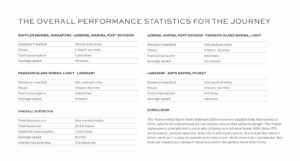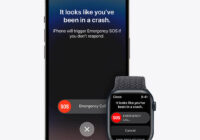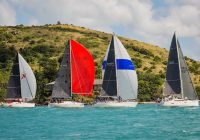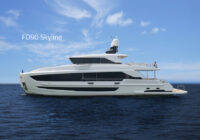Martin Holmes, the General Manager of Riviera dealership Lee Marine in Phuket, Thailand, offloads a new 4600 Sport Yacht from the ship in Singapore and undertakes a delivery trip to her new home in Phuket, cruising through the Malacca Strait and into the picturesque Andaman Sea.
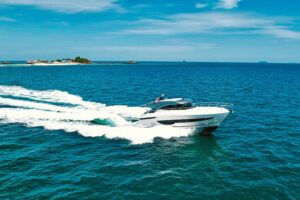
The Johor Strait lived up to its reputation. Lightning struck the waters around us and rain lashed the windscreen of our Riviera 4600 Sport Yacht.
Visibility shrank to 100 metres as we navigated carefully between the myriad cargo and super-tanker ships. My eyes flicked between the limited view ahead and the radar screen in front of me.
I was on a delivery voyage to take the new Riviera from Singapore to her home in Phuket in Thailand from where our Riviera dealership, Lee Marine, operates.
Johor Strait lies between the island of Singapore and Malaysia to the north.
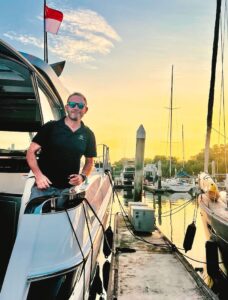
Raffles Marina, from which we left, is near the western end of Singapore and we travelled a short distance south into the Singapore Strait before turning north-west into the Malacca Strait, heading home. The Singapore and Malacca Straits are among the busiest shipping lanes in the world as they provide the safest and most straightforward route between the Indian and Pacific Oceans but, as a result, demand close attention by skippers of cruising boats.
I first saw the 4600 Sport Yacht Platinum Edition at the 2023 Sanctuary Cove International Boat Show in May and knew immediately that she would be perfect for the evolving tastes of our Southeast Asian clients. This region’s market has historically seen flybridge yachts as the popular choice but recently yachting enthusiasts are changing their ideas and lifestyles, favouring the more single-level entertaining designs.
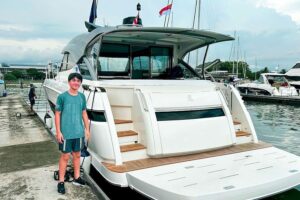
Over the years I have had the pleasure of being on board for the delivery of a range of Rivieras, from a 3000 Offshore all the way up to the flagship 78 Motor Yacht. Sometimes the proud new owner will join me for the journey and we will use the delivery trip to teach the owner and crew everything they need to know about the boat. At other times it may be just myself and a crew member from Lee Marine.
I have not spent much time on board Riviera’s Sport Yachts so was excited to see just how well she would perform, and how the handling may differ from a flybridge or SUV model.
You can’t always pick the date of a delivery and this one fell during a strong south-west monsoon. So, some serious weather forecasting and route planning was necessary. My 12-year-old son, Mason, was on summer holidays and joined me on this delivery along with Lee Marine deckhand Goh.
While we waited for the ship carrying the Riviera from Australia to arrive, Mason and I rented bicycles and toured around the sights of Singapore. A great thing to do and highly recommended for visitors.
We returned to the harbour to watch as a crane carefully lifted the new Riviera from the deck of a container ship and lowered her gently into the water, from where we drove her to the berth at Raffles Marina which we had booked for the arrival.
The next two days we spent cleaning and testing the yacht after peeling away the protective wrapping with which the Riviera team in Australia so diligently covers all yachts destined for overseas clients.
Every day brought intense thunderstorms. I used the Singapore radar web site to track them as they crossed Singapore and headed north into the Malacca Strait. As I studied the forecasts, it appeared that a favourable window might be opening. We had a chance to follow this window all the way up the strait.
Preparations complete, a quick trip to the supermarket to stock up on some supplies and we were ready for the four-day voyage north to the yacht’s new home in Phuket. We fuelled up, stocked the fridge and cleared immigration. It was time to go!
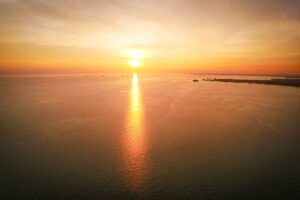
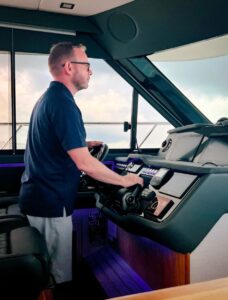
The voyage north from Singapore to Phuket is 550 nautical miles, beginning in the congested waters around Singapore and heading north-west up the 440-nautical-mile-long Malacca Strait between Malaysia and Indonesia and ending in the Andaman Sea.
It’s a great trip as every day we head further north the water becomes bluer and the islands and beaches are prettier. As there can be flotsam and fishing nets in the waters, especially during the monsoon season when heavy rainfall washes out through rivers into the straits, we drive only during daylight. The plan each day of this voyage was to cover about 120 nautical miles so that we could reach a marina before sunset, allowing us to check and clean the boat ready for an early departure the following morning.
There are marinas almost equidistantly on the trip north: Admiral Marina at Port Dickson, Pangkor Marina in Lumut and Langkawi Yacht Club which is close to the Thai border. None of these marinas offer fuel so all refuelling must be carefully pre-arranged using a tanker delivery, a fuel barge or even by jerry can as we had to do in Pangkor.
Our prediction to clear the storm on that first day proved correct. We left it in our wake and, by watching weather cells and keeping ahead of the fronts, we found ourselves in clear weather and sunshine for the remainder of the day.
We arrived in Admiral Marina mid-afternoon and proceeded to wash down the boat. Mason tried out his new fishing gear while I flew our drone and took some sunset photos over Port Dickson and the Malacca Strait.
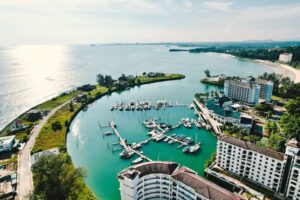
Fully refreshed the next morning, we transferred diesel from a truck and departed in late morning. The second day was a straight run which continued the north-west route to the northern end of the Malacca Strait where the shipping traffic peels off towards the Bay of Bengal and Indian Ocean. We passed the massive Port Klang, the closest sea port to the Malaysian capital, Kuala Lumpur.
Our route took us through ship anchoring grounds around Port Klang and gave us an opportunity to get up close and personal with some of them – but not too close!
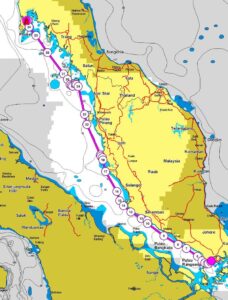
As we passed Port Klang we turned in a more northerly direction and followed the relatively shallow fishing grounds for a further 50 miles to Lumut. With average depths of not much more than five metres in these fishing grounds, one has to keep an eye out for fishing stakes, nets and traps. At least when the small fishing boats are out it’s a strong indicator of good weather.
We arrived in Pangkor Island Marina in Lumut and started the process of fuelling. This time the 1,200 litres we had ordered arrived in the back of a small truck in jerry cans and a 20-metre hose was used to siphon the fuel down into the boat. Needless to say, this took some hours but, with a few cold Tiger beers in the fridge on board, the young guys helping us fuel made sure that we got replenished in good time.
The marina was established in 2009 and the area is best known for pristine sandy beaches including Pasir Giam which connects to the coral-ringed Giam Island at low tide. Like much of Southeast Asia, it was colonised by the Dutch, and a fort dating back to 1670 demonstrates the island’s strategic colonial importance. Nearby, the Sacred Rock is inscribed with the symbol of the Dutch East India Company which dominated the region for much of the 17th century.
We departed Pangkor marina early next morning and made our way through the island passage to the north entrance and headed into open water. These waters are notorious for a confused sea state and it did not disappoint on this day. A powerful storm during the night whipped up a swell of about 1.5 metres from just the wrong angle, restricting us to run at between 19 and 22 knots. This day was the real test for the 4600 Sport Yacht and I was very impressed at just how comfortably she dealt with the conditions. She lived up to Riviera’s reputation for building blue-water cruising yachts. As the conditions slowly improved throughout the day our speed increased, although we kept the cruise below 23 knots for comfort. Passing the island of Penang, we again encountered a confused sea state but the boat was travelling well and everyone on board was comfortable.
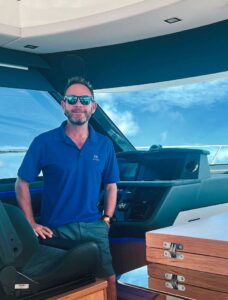
During this leg, an alarm sounded on the Garmin chartplotter. A distress beacon had activated about 10 miles out from our position. With no other boats in the vicinity, we donned our lifejackets, prepared a plan and headed out to the indicated position. We knew that an additional 20 miles added onto the day in these conditions was not ideal for us but, if there was someone in distress in the water, we would do all we could to help. As we got closer to the position, we spotted a small fishing boat and realised that they were using emergency beacons to mark their fishing floats so they could get back to them. False alarm and a common – if dubious – practice we later discovered. On that afternoon alone, we received a further three distress beacon alarms and ignored them as we could see that they were surrounded by fishing boats. This is something to bear in mind should you find yourself in an emergency and need to set off an alarm.
We eventually arrived in Langkawi mid-afternoon after seven hours of running. We fuelled at the tanker ship anchored in the bay and headed into the marina for a well-deserved wash and rest – both for the crew and the boat.
The final leg home is always an exciting one. The weather was picture postcard with clear skies and almost glass-out conditions. We departed the marina at 08:34 and cruised through the islands around Langkawi before setting the course for Phuket and opening the taps. As we crossed the border into Thai waters we knew we were getting close to home. The colourful Thai fishing boats were spread across the horizon and the islands we passed became greener and surrounded by coral fringes. The water became deep and blue and we had a superb cruise towards Phuket.
The most recognisable island is Phi Phi and this came and went in our wake as we cruised happily at 26 knots. Given the one-hour time difference between Malaysia and Thailand we were assured of an early arrival so decided to stop and anchor off Koh Khai Nai to tidy the boat and take the opportunity to take some photos and video using the drone.
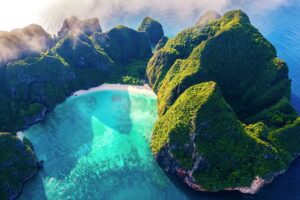
What a beautiful sight the 4600 Sport Yacht made gleaming shiny and new in her new home waters.
Phuket is probably the best-known tourism resort location in Thailand. It is hardly surprising. Fabulous beaches, a vibrant nightlife in the city and, for those of us fortunate to go cruising, stunning coastlines, crystal-clear waters and a plethora of beautiful islands and hidden coves as well as fishing villages, markets and temples on the islands. Perhaps the best known are Phi Phi Islands with their dramatic limestone cliffs and James Bond Island, made famous in the 1974 Bond movie The Man with the Golden Gun.
We pulled into Ao Po Marina in Phuket at 14:00 hours and were given a warm welcome from the owners of the Riviera 78 Motor Yacht Big Mama and Riviera 525 SUV Happy Ours. The newest member of the Riviera Thailand family had arrived and she looked resplendent in her berth awaiting new owners to enjoy her and make the most of boating in Thailand.
